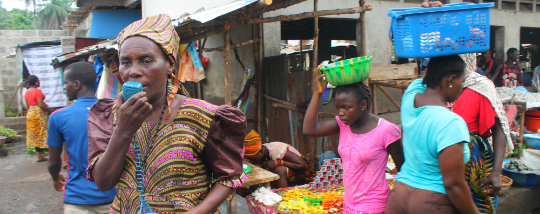
The "Building Adaptive Capacity to Catalyze Active Public and Private Sector Participation to Manage the Exposure and Sensitivity of Water Supply Services to Climate Change in Sierra Leone" project aims to enhance adaptive capacity of decision-makers in the public and private sector involved in water provision to plan for and respond to climate change risks on water resources. The project seeks to complement a number of water-related projects established by the UNDP and other funders in Sierra Leone. Within water resources management, the project focuses on addressing the skills deficit of water managers and the insufficient policy framework to secure the vital economic and the functionality of water management systems in a changing climate.
- Community
- National Governments
- Sierra Leone Environment Protection Agency
- United Nations Development Programme (UNDP)
- Global Environment Facility (GEF)
Expected outcomes
Outcome 1 - Critical public policies governing the management of water resources revised to incentivize climate smart investment by the private sector.
Outcome 2 - Existing water supply storage and distribution infrastructure made resilient against climate change induced risks (droughts, floods) in Freetown and at least three rural districts, with the support of private sector.
The project builds on a set of baseline projects which aim to improve the governance of water and reduce the impacts of natural disasters in Sierra Leone. These baseline projects, however, are unable on their own to address the skills deficit of water managers and the insufficient policy framework to secure the vital economic and the functionality of water management systems in a changing climate.
With a view on baseline projects, the proposed project will build on the following initiatives:
- Environmental governance and mainstreaming project (funded by the EU; financial scope: US$5,7000,000): The EU is supporting the Sierra Leone Environmental Protection Agency (SLEPA) to be fully operational and ensures that its core functions at the central and district level are implemented,
- UNDP/WMO/British Meteo support to the Meteorological Department (US$100,000): UNDP has developed MOU with WMO and is working with the British meteorology agency to build capacity of the Meteorological Department by establishing a public service that generates reliable data and maintains a national database for planning and monitoring development plans and programmes that contributes to good governance at national and district levels, and
- UNDP/The Community Empowerment and Development Project (CEDP- US$ 2,100,000): The CEDP is providing a wide spectrum of assistance to rural communities by improving the delivery of social services through the construction and rehabilitation of community and government infrastructure such as water and sanitation systems and the connection of the water distribution lines to the dam and water tank (reservoirs, etc.) within rural communities
- DFID Water, Sanitation and Hygiene programme (US$17,000,000). This baseline project seeks to strengthen the water and sanitation sector in Sierra Leone and enable rural and urban communities (and within those the most vulnerable members such as women and children) to adopt safe hygiene and sanitation practices and consume safe water. With funding by the UK government and UNDP as implementing partner, the project is supporting the development of water and sanitation facilities, promotion of household hygiene, and the training of water supply maintenance in Yele, Kono, Kambia, and Kabala.
Outcome 1: Critical public policies governing the management of water resources revised to incentivize climate smart investment by the private sector.
- Output 1.1 An integrated/sustainable climate information communication system established by the Meteorological Department to facilitate access to relevant high-resolution data, climate risk management tools (e.g. -maps) and information on climate change impacts on water resources.
- Output 1.2 More than 50 officers from the Water Policy Planning, Coordinating Unit (WPPCU) and the Sierra Leone Environment Protection Agency (SLEPA), Water Societies trained to generate, analyze and integrate climate risk information, including on climate induced disasters, into water policies and investments plans;
- Output 1.3 Climate monitoring system established for the Guma reservoir to analyze the water system‟s vulnerability and support decisions making on adaptation strategies.
- Output 1.4 Regular dialogue established between parliamentarians, local council‟s members, traditional authorities, NGOs/Community Based Organizations, and private sector (water societies) on the impacts of climate change on water supply and access in at least 3 local councils.
- Output 1.5 At least 2 dialogues under the Public Private Sector Forum initiated on requisite policies and supports for promoting investment and entrepreneurship development on managing climate change risks on water provision and usage.
Outcome 2. Existing water supply storage and distribution infrastructure made resilient against climate change induced risks (droughts, floods) in Freetown and at least 3 rural districts, with the support of private sector
- Output 2.1 Affordable climate-resilient community based water harvesting, storage and distribution systems designed, built and rehabilitated in Freetown, with the support of private sector, to withstand projected changes over the next 20 years in rainfall patterns and intensity (e.g. 10 communal reservoirs, 1500 rooftop catchment, 1500 rainwater storage tanks and conveyance systems)
- Output 2.2 Rehabilitation and construction of at least 30 gravity fed water systems, 100 small water reservoirs that are resilient to expected climate pressures over the next 20 years that provide water for communities and their economic activities during water shortages in at least 3 rural districts in Northern, Eastern, and Southern regions.
- Output 2.3 Capacity of more than 50 Water engineers (from both public and private sector), local community based management committees, youth and woman associations developed in designing and managing climate risks on small-scale water supply systems, as well as maintaining climate-resilient infrastructure;
- Output 2.4 Relevant experiences/lessons from community orientated climate resilient water infrastructure and management practices (including gender differentiated issues) identified, and widely shared/disseminated to facilitate replication in other vulnerable areas
- UNDPClotilde GoemanRegional Technical Advisor
- UNDPSam GobaProject Manager
